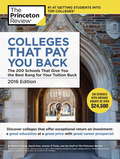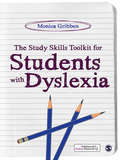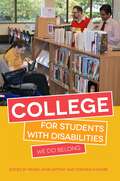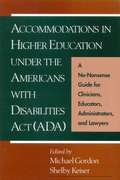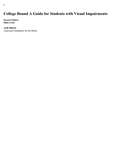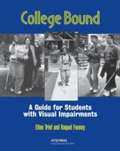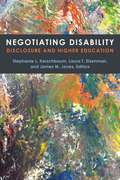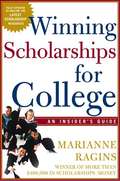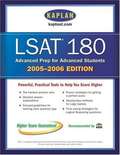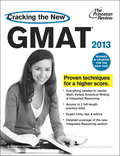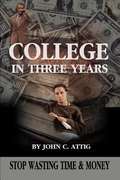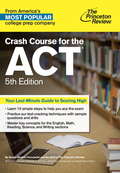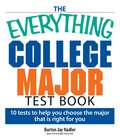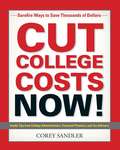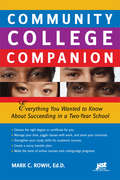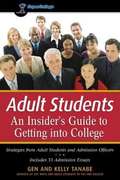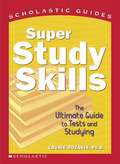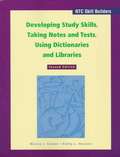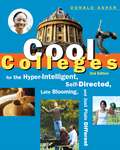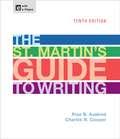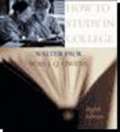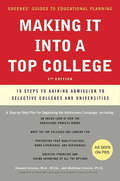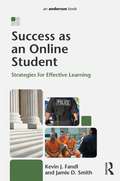Special Collections
Student Resources
- Table View
- List View
Colleges That Pay You Back
by Princeton ReviewGet the right return on your college investment with this guide to schools with excellent "Education ROIs": a great education & career prospects at a great price!College is a major financial investment, and one that too many students and parents enter into blindly. The Princeton Review erases that uncertainty with this guide to public and private schools where students get the best return on their tuition investment. That doesn't necessarily mean schools with the lowest price tags, but it does mean schools that give you the best bang for your buck: a combination of great academics with a great price and great experiences--for a great post-college outcome!Colleges That Will Pay You Back.* Our top-value picks--chosen based on 40+ data points, includingacademics, cost of attendance, financial aid, and post-grad salary figures* Profiles of 200 schools that offer a fantastic value, with insight into their careerservices offeringsUnique Ranking Lists.* The top 25 schools with the Best Alumni Network, Best Career Placement,Top Financial Aid, and more* The highest-paying majors and great schools that offer themValuable Career Information from PayScale.com.* Starting and mid-career salary information for graduates of each school* Percentages of alumni who report high job meaning and who majoredin science/technology/engineering/math (STEM) fields
The Study Skills Toolkit for Students with Dyslexia
by Monica Gribben'This toolkit is the student's safety net offering user friendly, down to earth advice and real life skills that have been tried and tested by the author'-Dr John Schneider, Educational Psychologist, Edinburgh 'This is exactly how I felt starting university ... a wonderful and very helpful book full of interesting and useful hints and tips on how to survive university as a dyslexic student. It doesn't make you feel silly or stupid but makes you feel you can achieve what you set out to do'-Sharon Patterson, Adult Nursing student, Edinburgh Napier University 'You realize you're in the hands of a professional who has taught thousands of students how to succeed at university'-Holly Pellicer, Dyslexia Advisor, University of Oslo Packed with helpful advice, checklists and templates, this book will help you improve your study skills throughout your time at university. Written in a straightforward, no- nonsense style, the guidance can be broken down into manageable chunks. Issues covered include: - procrastination - planning your assignment - understanding your essay question - researching, writing and referencing your written work - managing your own well-being. Drawing on years of experience running study skills workshops in higher education, Monica Gribben has written an accessible book for students with dyslexia that shows how to work through the challenges that studying presents. The companion Website www.sagepub.co.uk/gribben has podcasts, worksheets and electronic resources to support each chapter. Monica Gribben is a private dyslexia consultant and Dyslexia Adviser at Edinburgh Napier University.
College for Students with Disabilities
by Temple Grandin and Stephen M. Shore and Ehrin Mchenry and Dena Gassner and Mitchell Nagler and Francine Conway and Anita Frey and Alyssa L. Conigliaro and Chanelle Tyler Best and Karleen Haines and Sonia Minutella and Kelsey Mclaughlin and Melissa Mooney and Patrick Kelty and Pavan John Antony and Diana Damilatis and Kerry MagroSharing the personal stories of individuals with disabilities who describe both the challenges and successes of their time in higher education, and with a major section on the findings of broad ranging research into the experiences of such students, the book explores the current situation, what works, and how things can be improved.
"You are not college material" or "you don't belong in college" are comments frequently heard by students with disabilities. Despite this, college education is now an expected part of the transition to adulthood for many individuals with disabilities. The book includes practical advice to encourage self-advocacy in students with disabilities, and to support the professionals who are facing the challenges alongside them.
Covering cerebral palsy, autism spectrum disorders, intellectual disabilities, and much more, this is vital reading for parents, individuals with disabilities, school teachers, college professors, and professionals working with adults with disabilities.
Accommodations in Higher Education under the Americans with Disabilities Act
by Michael Gordon and Shelby Keiser and Alta LapointThis manual outlines how the ADA applies to a wide range of mental and physical impairments within higher education settings, it outlines a series of fundamental principles and actual clinical/administrative procedure
College Bound
by Ellen TriefThe transition from high school to college is a significant turning point in a student's life, and this easy-to-read guide gives students the tools they need to select and apply to college and move forward with skill and confidence. Everything a student needs to know is included, from developing organizational, note-taking, test-taking, and study skills to managing living space, student-teacher relationships, social and academic life, and extracurricular and leisure time activities is included.
College Bound
by Ellen Trief and Raquel FeeneyThis book provides an essential reference source, serving as both a step-by-step guide for students to use independently and a much-needed text for educators to use to prepare students with visual impairments and blindness for success in college. It is organized into sections that can be read and worked on independently in whatever sequence best meets the student's needs. Appendixes contain charts that can be reproduced, resources for further information, and sources of products and materials.
Negotiating Disability
by Stephanie L Kerschbaum and Laura T Eisenman and James M JonesDisability is not always central to claims about diversity and inclusion in higher education, but should be. This collection reveals the pervasiveness of disability issues and considerations within many higher education populations and settings, from classrooms to physical environments to policy impacts on students, faculty, administrators, and staff. While disclosing one’s disability and identifying shared experiences can engender moments of solidarity, the situation is always complicated by the intersecting factors of race and ethnicity, gender, sexuality, and class. With disability disclosure as a central point of departure, this collection of essays builds on scholarship that highlights the deeply rhetorical nature of disclosure and embodied movement, emphasizing disability disclosure as a complex calculus in which degrees of perceptibility are dependent on contexts, types of interactions that are unfolding, interlocutors’ long- and short-term goals, disabilities, and disability experiences, and many other contingencies.
Winning Scholarships for College
by Marianne RaginsIn this thoroughly revised third edition of Winning Scholarships for College, Marianne Ragins proves that it's not always the students with the best grades or the highest SAT scores who win scholarships. Whether you are in high school, returning to or currently enrolled in college, planning to study abroad, or interested in pursuing an M.B.A., J.D., or M.D., this easy-to-follow guide will show you the path to scholarship success. This is one of the most comprehensive books on winning scholarships available-it reveals where and how to search for funds and takes you step by step through the application process. The third edition includes information on the 2001 education tax breaks, college savings funds, service scholarships, and many new sources of scholarship money. Written from one student to another, Winning Scholarships for College also includes - hundreds of invaluable resources for uncovering scholarship opportunities - information on using the Internet to make your search easier - an in-depth look at how financial aid packages are prepared - foolproof tips for scoring high on the new SAT and ACT - clever suggestions for writing winning personal essays with examples from Ragins's personal scholarship search
LSAT 180
by Eric GoodmanThe challenging practice and proven strategies you need to get a perfect score on the LSAT. This advanced guide includes: the toughest questions, the most effective logic games tactics, powerful reading comprehension strategies, top scoring logical reasoning techniques
Cracking the New GMAT, 2013 Edition
by Princeton ReviewIf you need to know it for the next-generation GMAT, it's in this book. Cracking the New GMAT, 2013 Edition has been completely revised and updated for the June 2012 changes to the GMAT. This ebook edition has had all questions, answers, and explanations cross-linked for easy on-screen viewing, and includes: * Access to 2 full-length practice tests * Tons of sample problems and drills in the book covering all 4 GMAT sections, plus more extra practice on the companion web site * Step-by-step instruction on the new GMAT question types: table analysis, graphics interpretation, multi-source reasoning, and two-part analysis * Thorough review of all tested topics, including data sufficiency, arithmetic, algebra, geometry, sentence correction, reading comprehension, critical reasoning, and more
College In Three Years
by John C. AttigShows how to complete college in three years using high school, internet, placement tests, correspondence and other resources while avoiding common excessive expenses.
Crash Course for the ACT, 5th Edition
by Princeton ReviewYour Last-Minute Guide to a High ACT Score!This eBook edition has been specially formatted for on-screen viewing with cross-linked questions, answers, and explanations.If the big test is looming and you haven't opened a book yet, then here's your last-minute reprieve. Crash Course for the ACT details the most critical tools and rules you need to help you get a high score with limited prep time. By following the 10 simple steps in this book, you'll be on the way to your best score. Everything You Need to Help You Achieve a High Score--Condensed. · Concise, expert reviews of all question types you'll see on the test· Up-to-date information on the ACT· Essential, targeted strategies and exercises for each section of the exam Practice Your Way to Excellence.· Dozens of practice questions with detailed explanations· In-depth instructions to help you write a high-scoring essay· Guided practice in every chapter
The Everything® College Major Test Book
by Burton Jay NadlerWith nearly 40 percent of incoming college freshmen undecided on a major, and with 75 to 80 percent of all students changing their majors at least once during their college career, students are begging for a straightforward guide to help them make the best choice. With 10 tests designed to pinpoint a student's talents, aptitudes, and affinities, The Everything College Major Test Book is the only book out there that makes choosing a major easy--and fun!
Reducing Barriers to Training of Blind Graduate Students in Psychology
by Heidi JoshiTo increase the number of psychologists with visual impairments, all levels of the pipeline, from graduate training through practica and internship, need to be accessible to this population. This study sought to determine the types of barriers students who are blind face in their psychology graduate programs. The areas explored in the study included accessing printed materials throughout participants graduate process, administering and scoring test protocols, accessing sources for research, and obtaining campus-wide communications. Attitudinal barriers were also explored in this study, particularly from supervisors, instructors, and peers. There is very little research in this area and as a result, this study was designed to elucidate the experiences of participants with visual impairments in their graduate programs. One goal was to give training institutions a better understanding of the barriers faced by students who are blind. Nineteen participants were interviewed using a semi-structured questionnaire consisting of yes/no and open-ended questions. Descriptive statistics were utilized in order to obtain the major themes of the responses. The most universal barrier related to the plethora of printed material encountered in graduate training. Nearly all of the participants discussed difficulties in obtaining printed material in alternate formats. They especially found it difficult to get enough sources in a timely manner for their research. Participants discussed missing class changes or other important details due to this information being posted in print and not accessible to them. Attitudes were a second barrier frequently encountered. Participants stated that they had to contend with the prejudicial attitudes of supervisors, professors, and peers who were meant to assist them in their process. Participants also discussed their wish to have more disability related awareness and education activities implemented in the curriculum of their graduate institutions. This would assist these institutions in overcoming the attitudinal barriers experienced by their students who were blind. However, participants also discussed supportive factors such as partners and professors who would provide appropriate classroom accommodations. Despite the over thirty years since passage of the rehabilitation act, and the fourteen years since the implementation of the American with Disabilities Act. Results indicate that numerous barriers still exist for graduate psychology students who are blind. These barriers must be aggressively addressed for persons who are blind to be afforded equal access to training in psychology.
Cut College Costs Now!
by Corey SandlerDrawing on insider advice from a roundtable of college administrators and financial planners, Cut College Costs NOW! shows you the best ways to manage spending, apply for financial aid, and increase your eligibility for federal, state, and private funding.
Community College Companion
by Mark C. RowhStudents will explore certificate and degree options; connect their needs, plans, and personalities to courses and programs; and gain tips for enhancing their financial aid package and scoring scholarships.
Adult Students
by Gen Tanabe and Kelly TanabeWhether you are going back to school for the first time, returning after an absence or advancing or changing your career, this book will help. Adult Students guides you step-by-step through the entire admission process from making the decision to return to college to gaining admission to figuring out how to pay the tuition bills.
The ABC's of College Planning
by Bernice HornchakThis book is a service project of the New Jersey Association for College Admission Counseling. Its chapters draw on the collective knowledge, experience and expertise of admission and guidance professionals who have helped thousands of high school students make a successful transition to college.
Super Study Skills
by Laurie RozakisFrom the Book jacket: Knowing how to study is important if you want to do your best in school. Super Study Skills: The Ultimate Guide to Tests and Studying has the helpful tips all students need to become more successful. Super Study Skills will show you how to * Study smarter to get the grades you want * Take tests with confidence * Get organized * Use your time more efficiently * Take great notes * Improve your reading comprehension * Reduce test jitters Plus Super Study Skills offers tips for taking specific kinds of tests, including true/false, essay, multiple choice, and more. Whether you are preparing for a standardized test, getting ready for a classroom quiz, or trying to improve your grades, Super Study Skills can help you reach your goals.
Developing Study Skills, Taking Notes and Tests, Using Dictionaries and Libraries
by Marcia J. Coman and Kathy L. HeaversWere you ever taught how to study? Instructors often assume that students beyond grade school know and use good study techniques. You may know some people who seem to be able to do more in less time and get good grades besides. How do they do it? In this unit you will learn some simple techniques that good students consider most important when studying. Now you can discover some of their secrets.
Cool Colleges
by Donald AsherFully revised since the first edition, COOL COLLEGES covers the most exciting schools in the U.S. and Canada, with a new chapter on eco schools, an update on tuition-free schools, and the total low-down on the so-called top-ranked schools. Are you hyper-intelligent? Self-directed? A late-bloomer? Or just different? Then you need a great school that will challenge, nurture, inspire, and motivate you-and COOL COLLEGES has got 'em. It will also give you the scoop on: What the Ivy league is and what it really wants; Totally free schools, including one where financial need is a requirement for admission; Universities that don't give grades; Schools that don't want your SAT scores; Data on the highest (and lowest) paying majors; The schools that graduate the most millionaires; Men's, women's, and minority-focused colleges; Schools where you can design your own degree program; A college where you can hike and camp your way to a degree; A college that runs its own ranch on an 80-square-mile campus; Science and engineering schools where undergrads get their own labs; The most competitive colleges, including one that rejects 95% of applicants; Campuses where students love to study, even on Saturday nights; Schools that offer programs in computer game studies, comedy, auctioneering, special-effects makeup, and more; Plus a link to the Web addresses for every college and university in the United States and Canada. COOL COLLEGES is the resource for finding your dream school-and gives you the edge you'll need to get accepted. Reviews: "Worth a look, if you're headed for college or getting ready to apply."-San Diego Union Tribune. I received a used copy of your book, Cool Colleges (2nd Edition) in the mail this morning and (admittedly) out of vague interest and the slight boredom that comes with not having a driver's license, I picked it up and went about my usual hole-up-in-my-bedroom-with-new-book-and-blinds-down-and-stay-holed-until-I-have-finished-the-text-in-it's-entirety routine. The purpose of this message is to express my nearly inexpressible gratitude to you and your associates in research. I have read life-changing books, articles, and speeches but I have never, not once, been so deeply affected by a work of this type: A guidebook? I have perused U.S. News & World Report's 2007 College Guide and the Newsweek/Kaplan 2007 College Guide, each with their individual talents and faults, but your book was different. For once I felt like the book was directed to students such as myself. I'm not an athlete and I'm no an academic superstar: at my school, that's what it takes to be a favorite. I am just another mediocre teenager in millions who wants to save the world.Your book made me feel, for once, as though someone was looking at those of us hanging by our fingernails on the edge of being completely lost in our distinction. I love to learn for the sake of learning and not because I'm aiming for any star-studded diplomas or accreditations, but because there is so much to learn. Your book not only allowed me to see that there were other "Lost Kids" (that's what my guidance counselor called me) but further that there were places trying to find us because we aren't as lost as some of our superiors like to think. Again Sir, thank you for all your work. It has not gone unnoticed nor was it in vain. If nothing else, you made at least one girl's life (and future) a little brighter. -Carina, 17 St. Petersburg, FL.
The St. Martin's Guide to Writing (Tenth Edition)
by Rise B. Axelrod and Charles R. CooperThe best-selling college rhetoric for over 25 years, The St. Martin's Guide has achieved an unmatched record of success by providing practical innovations for the ever-changing composition course. The acclaimed step-by-step Guides to Writing offer sure-fire invention strategies to get students started, sentence strategies to get and keep students writing, and thoughtful revision strategies to help students make their writing their own. With more hands-on activities for critical reading and working with sources, greater emphasis on the rhetorical situation, a revamped design that helps students see what they need to do at a glance, and a greater variety of formats (cloth, paper, loose-leaf, and e-books), the Guide is better than ever. The print text is now integrated with e-Pages for The St. Martin's Guide, designed to take advantage of what the Web can do.
How to Study in College
by Walter Pauk and Ross J. Q. Owens8th Edition: Our ultimate goal in this book is to provide you with tools, skills, and systems that will lead to self-sufficiency.
Making It into a Top College
by Howard Greene and Matthew W. GreeneLet America's premier college consultants take the mystery out of admissions. As seen on PBS, this proven, ten-step program offers a comprehensive inside view of the state of college admissions today. Educational consultants Howard and Matthew Greene have mastered the science and art of college admissions, helping tens of thousands of students get into their schools of choice. This highly effective program is now available to all students who want to attend an outstanding college or university. The Greenes' cutting-edge approach will teach you to: Think like an admissions officer Plan a comprehensive admissions campaign Understand and take advantage of current trends Implement the best strategies for standing out Whether it's choosing the best college for you, writing a winning personal statement, or planning your college financing, this fully updated new edition gives you the latest in admissions secrets, statistics, tactics, and facts.
Success as an Online Student
by Kevin J. Fandl and Jamie D. SmithThis book presents concise guidance to make the online learning journey enjoyable, productive, and most of all, worthwhile.
